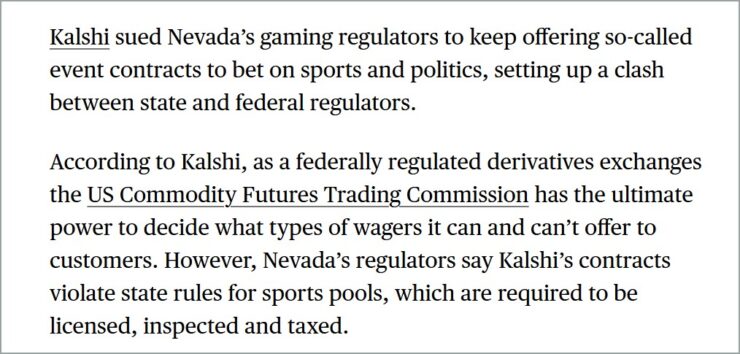Kalshi has taken legal action against both the Nevada Gaming Control Board and the New Jersey Division of Gaming Enforcement, arguing that recent enforcement actions against its operations are unlawful under federal preemption principles. The lawsuits reported by Bloomberg follow cease-and-desist orders from both state regulators, which accused Kalshi of offering unauthorized sports betting contracts to residents.
Nevada’s Gaming Control Board issued its letter on March 4, alleging that Kalshi’s event-based offerings amounted to operating an unlicensed sports pool, in violation of state gambling laws. A similar order arrived from New Jersey on March 27, claiming Kalshi had violated the New Jersey Sports Wagering Act, which restricts sports betting to state-licensed operators.
In its lawsuits, Kalshi argues that it operates under the authority of the Commodity Futures Trading Commission (CFTC) as a designated futures exchange, and that the Commodity Exchange Act (CEA) preempts any conflicting state law. “New Jersey’s attempt to regulate Kalshi intrudes upon the federal regulatory framework,” the company’s legal filing states, asserting that both field and conflict preemption prohibit state interference.

Federal vs. State Jurisdiction at the Heart of the Dispute
Kalshi’s central argument hinges on the assertion that its operations fall exclusively under the purview of the Commodity Futures Trading Commission (CFTC), a federal entity. The platform contends that its event contracts are financial instruments designed for hedging market risks, distinguishing them from traditional gambling or betting products. This position challenges the authority of state regulators to impose restrictions on its federally sanctioned activities.
“The threatened actions in Nevada and New Jersey seek to undermine not just Kalshi’s contracts, but the authority granted by Congress to the Commodity Futures Trading Commission, which has safely and effectively governed commodities markets for decades,” Kalshi CEO Tarek Mansour said in a statement.
Regulatory Actions Prompt Legal Response
At the heart of Kalshi’s legal challenge is a fundamental question: Are event-based contracts financial derivatives or unlicensed gambling? While Kalshi positions itself as a CFTC-regulated exchange offering market-based hedging tools, regulators in Nevada and New Jersey argue that its contracts are little more than sports bets dressed in financial clothing.
Nevada’s Gaming Control Board contends that Kalshi’s contracts resemble traditional wagers, as payouts depend solely on the outcome of real-world events—such as a basketball game or an election—rather than any strategic input by the trader.
“The payouts for picking the winner… are not based on the actions of the person entering the contract,” the board wrote in its enforcement notice.
New Jersey’s order echoes this view, citing state constitutional provisions that explicitly ban wagering on in-state college sports events or any contests involving New Jersey teams, regardless of venue. The state claims that Kalshi’s NCAA-related contracts fall directly afoul of those restrictions.
Kalshi, however, maintains that its offerings are legitimate financial instruments, not gambling products, and are subject to “extensive federal oversight” by the Commodity Futures Trading Commission. In its court filings, the company insists that event contracts—whether tied to politics or sports—are no different from other tradable financial products governed under the Commodity Exchange Act.
“Prediction markets are a critical innovation of the 21st century, and like all innovations, they are initially misunderstood,” said Mansour.
“We have been targeted before, we have fought before, and we have won before. This time will be no different.”
Quick Facts:
- Kalshi has filed federal lawsuits against Nevada and New Jersey gaming regulators to challenge cease-and-desist orders targeting its sports-related event contracts.
- The platform asserts that its operations are regulated by the CFTC and should not be subject to state-level gambling laws.
- State regulators allege that Kalshi’s event contracts constitute unauthorized sports wagering within their jurisdictions.
- The legal outcomes may have far-reaching implications for the regulation and operation of prediction markets nationwide.





